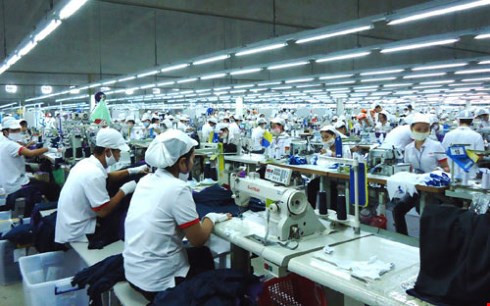Difficult to apply the policy of female workers being allowed 30 minutes off on "red light" days
Business representatives said that many policies in Decree 85 for female workers are very difficult to implement.
Decree 85/2015/ND-CP of the Government detailing a number of articles of the Labor Code on policies for female workers clearly states: Female workers who are raising children under 12 months old are entitled to 60 minutes off each day during working hours to breastfeed, express milk and rest; during menstruation, they are entitled to 30 minutes off per day, at least 3 days per month, with full pay during the break.
 |
| Photo is for illustration purposes only. |
However, many female workers are still unfamiliar with this regulation. Ms. Nguyen Thi Hong, a worker at the 29/3 Hoa Khanh Textile Company in Da Nang City, did not know that she was entitled to a 30-minute break on her “red light” days according to current regulations.
Ms. Hong said: “I have never heard of this law. If it is applied, we will be very happy. Because on days like this, a 30-minute break is really precious. But where can we find a place to lie down at the company?”
Meanwhile, representatives of businesses with many female employees also said that this regulation is very difficult to implement. For companies with up to 80% female employees, such breaks greatly affect the production line, especially at times when there are urgent orders.
Mr. Ho Sy Tan, Chairman of the Trade Union of Kad Industrial Co., Ltd. in Vietnam, in Hoa Khanh Industrial Park, Da Nang City, a unit with more than 1,000 workers, most of whom are female, commented: “We do not know which day or who has time off. The regulation is to give them time off, but not giving them time off and paying them in cash is also a violation. Therefore, that is not practical, because it is impossible to monitor each person individually, not to mention the impact on production.”
The new policy for female workers under Decree 85 stipulates: Employers must ensure that there are enough showers and toilets at the workplace; encourage the application of flexible working schedules that suit the wishes of female workers.
However, according to Mr. Le Duy Luong, Human Resources Director of Foster Group Japan in Vietnam, this regulation is not feasible. Mr. Luong said: Foster Company currently has about 30,000 employees, 90% of whom are female. According to the Company's survey, many female employees do not need to shower before going home, because the working conditions here are clean, with very little dust. Moreover, the general mentality of female employees is to want to go home immediately after finishing work. Therefore, building a bathroom is not necessary for some businesses.
Also according to Decree 85, the Ministry of Education and Training is responsible for directing localities to review and evaluate the ability of the network of preschools and kindergartens in the locality to meet the childcare needs of workers, officials and employees of industrial parks; advise on planning the development of a network of schools and classrooms to meet the childcare needs of workers, officials and employees of industrial parks; ensure that each commune, ward and town has at least one public preschool.
These regulations seem too far-fetched, as Mr. Ngo Van Sang, an official of the Department of Labor, War Invalids and Social Affairs of Da Nang City, said that this is very difficult, causing difficulties for businesses: "Currently, in the situation of administrative and career civil servants, we cannot establish public kindergartens. The cost of sending children to public schools is always cheaper than that of socialized schools. It also adds a direct or indirect cost to businesses. Because if workers are not satisfied, they will move, then in reality these costs will also fall on businesses."
According to the General Statistics Office, there are currently nearly 26 million female workers nationwide, accounting for nearly 49% of the social workforce. Improving health care conditions for female workers is one of the solutions to help businesses attract and retain workers.
However, with the unrealistic regulations set forth by Decree 85, it has unintentionally put employees and employers in a difficult position. Is that why, nearly a month since Decree 85 took effect, the policies for female employees have not yet been put into practice?./.
According to VOV
| RELATED NEWS |
|---|






